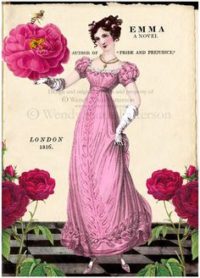It is poverty only which makes celibacy contemptible
 Emma
Emma
by Jane Austen
In my late teens I went through a serious period drama phase, fuelled by TV miniseries based on classic books. A particular favourite was the 1996 ITV production of Emma starring Kate Beckinsale. I loved that show and watched it so many times I can still picture every scene now, a good 15+ years after I last saw it. Plus, of course I’ve seen the Gwyneth Paltrow film (meh), the 2009 BBC series starring Romola Garai (okay) and the greatest (or at least the most fun) Austen adaptation of them all, Clueless.
So you’d think I would have read Emma long ago. However, to date my experience of Jane Austen has not gone so well. I quite liked Northanger Abbey but I gave up multiple times on both Pride and Prejudice and Sense and Sensibility, finding the stuffiness outweighed the wit. I can’t say finally reading Emma has won me over; largely I think I only got through it because I already knew it so well.
Emma Woodhouse is young, rich, devoted to her family and determined to be cheerful. Her elderly father doesn’t like to go out and she doesn’t like to leave him home alone, so ever since her governess Miss Taylor left to marry Mr Weston she has been pretty bored. She makes friends with Harriet Smith, a girl of unknown parentage who was raised by the local schoolmistress. Harriet is dull but straightforward and quick to adore Emma. Emma’s friend and adviser Mr Knightley (her sister’s husband’s brother, who lives nearby) thinks she would do better to befriend Jane Fairfax, who is intelligent and accomplished. But Emma has always found Miss Fairfax cold and distant, not to mention being a little jealous of her musical skill.
“Harriet certainly was not clever, but she had a sweet, docile, grateful disposition, was totally free from conceit, and only desiring to be guided by any one she looked up to. Her early attachment to herself was very amiable; and her inclination for good company, and power of appreciating what was elegant and clever, shewed that there was no want of taste, though strength of understanding must not be expected.”
Of course, the heart of the story is Emma’s matchmaking. Flushed with the success of Mr and Mrs Weston’s happy marriage, which she takes personal credit for, she starts to cast her eye about the local village for more potential matches. Once again, Mr Knightley disapproves, but Emma is not to be easily discouraged, even when things inevitably go wrong.
It’s a sweet story with interesting characters who aren’t as stereotypical as they first appear. Austen had an eye for character detail and turns of phrase. Emma isn’t the airhead you might expect from watching some of the TV or film versions of the story. She can be thoughtless, but she is not selfish. She truly wants to be good and to do well by others. I liked being in her company. About some other characters, Austen’s wit can be a little cruel, though an intrinsic part of Emma’s story is recognising the need to be charitable.
“I shall not be a poor old maid; and it is poverty only which makes celibacy contemptible to a generous public! A single woman, with a very narrow income, must be a ridiculous, disagreeable old maid! the proper sport of boys and girls; but a single woman, of good fortune, is always respectable, and may be as sensible and pleasant as any body else. And the distinction is not quite so much against the candour and common sense of the world as appears at first; for a very narrow income has a tendency to contract the mind, and sour the temper. Those who can barely live, and who live perforce in a very small, and generally very inferior, society, may well be illiberal and cross.”
However, the stilted language still put me off. This was less funny than Pride and Prejudice and the main romance happens much more quickly. At times the only thing that kept me reading was picturing Kate Beckinsale, Mark Strong and Olivia Williams making awkward small talk in the 1996 miniseries. On reflection it was a very faithful screen adaptation. Or maybe I just got so good at picturing those actors that I pictured them in every line I read.
I probably will gradually read all Austen’s books at some point, but I’m in no rush.
First published 1815.
Challenges: This counts towards the Gilmore Girls Reading Challenge and Classics Club.
Source: Project Gutenberg.